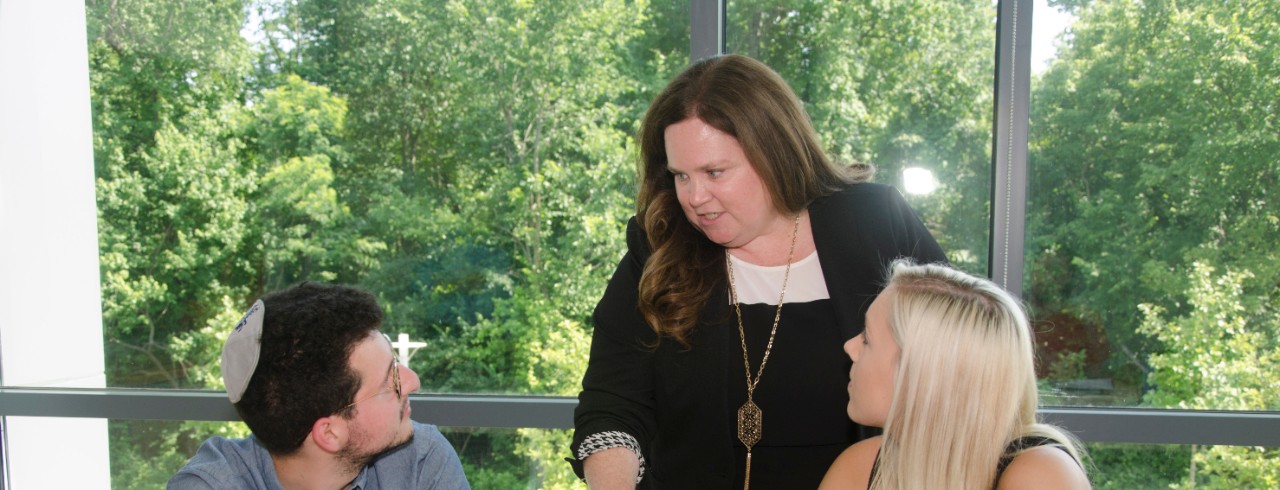
Washington Post: UC Blue Ash professor researches racial disparity related to Covid-19
Wendy Calaway is gaining national attention for her research on the enforcement of Covid-19 laws

Professor Wendy Calaway
Extensive research over the past several decades has documented how minorities are stopped and arrested at higher rates than caucasians, and how they typically receive higher pretrial bonds and more harsh sentences. A professor at the University of Cincinnati Blue Ash College is playing an important role in the conversation about whether these trends are continuing with the enforcement of broad new laws related to the Covid-19 pandemic.
Wendy Calaway is a practicing attorney and criminal justice professor at UC Blue Ash College. She was recently interviewed for a story in the Washington Post that examined whether black and Latino residents across the U.S. are facing harsher treatment than their white counterparts as police enforce stay-at-home orders and social distancing guidelines.
The article noted specific cases around the country, including that of Rashaan Davis. He is the black man who was arrested in March after posting a video of himself and others in Over-the-Rhine ignoring Ohio’s new stay-at-home order. Police arrested Davis and prosecutors charged him with violation of the order, a misdemeanor, and inciting violence, which is a felony. His bond was set at $350,000.
Calaway has worked with a colleague to conduct research on the need for bail reform in the U.S. Their findings, which have been published in prominent law reviews, show how the system disproportionately punishes poor and minority people who can’t post bail and are forced to spend time behind bars awaiting trial without being convicted of a crime.
That research was a big reason Calaway got involved with the Davis case. “I was concerned when the stay-at-home order was issued that disparate enforcement would be a problem,” says Calaway. “When Rashaan was arrested and his case hit the news cycle, the disparity in his arrest and bond was startling, as was the rhetoric around the case.”
Though she did not represent Davis, Calaway filed a brief to explain why the bond was unconstitutional and note the racial disparities in the way the stay-at-home order was being enforced. Her efforts resulted in the misdemeanor charge getting dropped and Davis being released from jail on electronic monitoring. The felony charge remains, pending a grand jury hearing.
The article notes that Calaway and other professors have reviewed arrest data from the first days of the stay-at-home order in Ohio. They found that 14 of the 20 people arrested in Hamilton County were black. Of the white defendants, 95 percent were released without bond, while that was true for less than half of the black defendants. The article also highlights numerous incidents nationwide where minorities are singled out and treated as criminals for minor social distancing violations, or simply for wearing a mask to protect their health.
For Calaway, the research continues on the developments from the past few months. She and a colleague are currently working on a journal article about the contrasting response of the criminal justice system to people of color who are accused of violating stay-at-home orders and how it highlights the disparities across the system.
“I think this is a really important conversation to have right now in the broader context of race in this country,” says Calaway. “The hope with this research is that people start to see how and why this is happening so that we can all work to change these practices to ensure equal just for all becomes a reality and not just a slogan.”
Read the full story here.
About UC Blue Ash College
UC Blue Ash College is a regional college within the University of Cincinnati. It offers one of the best values in higher education with access to a nationally recognized UC education in more than 50 degree and certificate programs, as well as tuition that is about half of most colleges and universities. The college is located on a scenic 135-acre wooded campus in the heart of Blue Ash, Ohio. To learn more, call 513-745-5600, visit us online, like us on Facebook or follow us on Twitter and Instagram.
Related Stories
Before the medals: The science behind training for freezing mountain air
February 19, 2026
From freezing temperatures to thin mountain air, University of Cincinnati exercise physiologist Christopher Kotarsky, PhD, explained how cold and altitude impact Olympic performance in a recent WLWT-TV/Ch. 5 news report.
Blood Cancer Healing Center realizes vision of comprehensive care
February 19, 2026
With the opening of research laboratories and the UC Osher Wellness Suite and Learning Kitchen, the University of Cincinnati Cancer Center’s Blood Cancer Healing Center has brought its full mission to life as a comprehensive blood cancer hub.
Generous gift supports renovations to UC Blue Ash Veterinary Technology Building
February 18, 2026
A longstanding relationship between Greenacres Farm in Indian Hill and the Veterinary Technology Program at UC Blue Ash College has led to a generous gift that will support a major renovation project.
